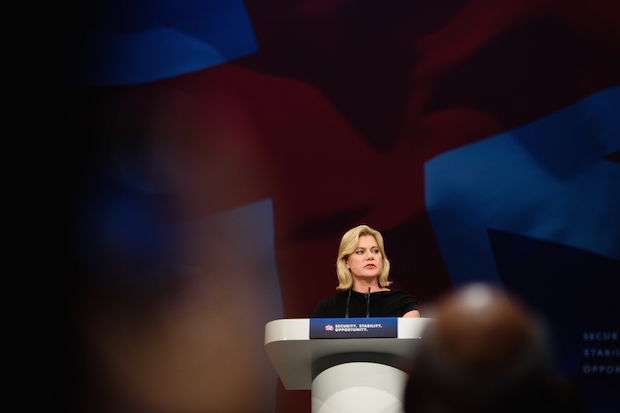Justine Greening’s brief as International Development Secretary is really quite specific. It certainly doesn’t require wide-ranging speeches about social mobility or domestic policy. And while Greening didn’t give a wide-ranging speech in her address to the Tory conference today, she did insert little snippets about her own life in a way that suggested she isn’t keen to remain International Development Secretary for ever. For instance, she said:
‘Wherever you are in the world, young people tell me they want the same thing, a job and the dignity of work. I know that the toughest year of my childhood in Rotherham was the year my dad was unemployed.’
And she also said:
‘Having been in business for 15 years before entering Parliament, I’m determined to make sure my department delivers value for money.’
It’s hardly the most personal speech ever, but it was the most personal of the afternoon, which suggests at least that Greening feels the conference hall needs to get to know her a bit better. This is, of course, not her first speech as International Development Secretary to the Tory conference, but it is probably the first I’ve heard where she’s tried to inject genuine passion and zeal for the role into what she said. She spoke with the apparent zeal of the convert about the importance of development spending, both for moral reasons and those of Britain’s own security:
‘I didn’t go into this job with rose-tinted glasses on. As an accountant that would have been impossible! But I’ve seen for myself that our country’s reputation, it carries serious weight. As Conservatives, we want a strong United Kingdom, a Britain that stands tall in the world. A Britain with a proud past, yes, but we want to build a Britain that can have a proud, prosperous and secure future.
‘And it was our Conservative Prime Minister – David Cameron – who had the foresight to put international development at the heart of our national security and foreign policy.
It wasn’t an easy commitment to make, just as British taxpayers were making personal sacrifices to help put things right after Labour’s latest economic mess. And believe me, doing this job, I’ve heard and thought about the arguments against aid as much as anyone else.’
That she wants to make those arguments herself, rather than simply sticking to a narrative about ensuring value for money in development spending, suggests that Greening has grown in confidence. Perhaps that confidence is what is driving her to talk about her own back story, too.







Comments